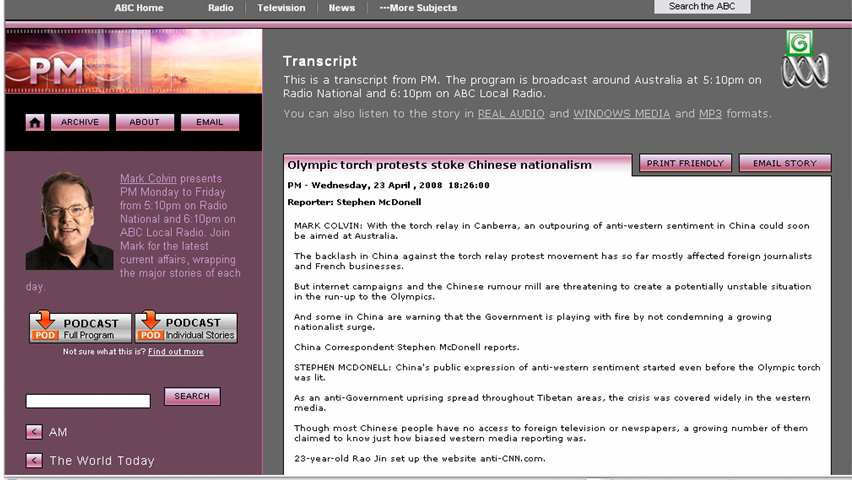|
|
This is a transcript from PM. The program is broadcast around Australia at 5:10pm on Radio National and 6:10pm on ABC Local Radio.
这是一份PM的记录副本,该栏目于下午5点10分国家电台在全澳洲播出,下午6点10分在澳大利亚国家广播公司本地电台播出。
【译文】
奥林匹克火炬传递给中国民族主义火上浇油
PM- 2008年4月23日,周三,18:26:00
记者:史蒂芬.麦克当内尔
马克·考文:“随着火炬在堪培拉的传递,在中国迸发出来的一股反对西方的情绪会很快瞄准澳大利亚。”
在中国,针对火炬传递的抗议活动而产生的强烈反响,目前基本上只影响了外国记者和法国的一些商业。
但是,在奥林匹克前,因特网上的运动和中国的谣言工厂,有可能在奥运之前造成一个潜在的不稳定局面。
在中国有人警告说,政府对正在增长的民族主义浪潮不加指责,实在是一种玩火行为。
驻中国通讯员史蒂芬.麦克当内尔报道。
史蒂芬.麦克当内尔:“中国公众表现出的反西方情绪在奥林匹克火炬点燃之前就开始了。”
当反政府的起义遍布整个西藏地区时,(那里的)危机只在西方媒体被普遍报道。
尽管大多的中国人没有渠道接触外国电视或者报纸,但是他们中越来越多的人(竟然)声称了解西方媒体的报道是多么偏见。
23岁的饶谨成立了anti-CNN.com网站。
饶谨:“事实上,许多西方媒体的报道是不客观的。我为此感到气愤,所以我成立了这个网站。成立这个网站的目标不是回顾(已经)发生的事。而是为了谴责和批评我们看到的一些不准确的报道,至少是从一个新闻工作者专业的观点出发。”
我想所有这些愤怒是可以理解的。这些人陷入这样一种情绪中是必然的。
史蒂芬.麦克当内尔:“当奥林匹克火炬在全世界点燃,然后支持藏人的抗议者们跟着它,(所以)反西方的情绪就转嫁到了其他目标上了(此“目标”指那些火炬抗议者——译注)”
在巴黎,市政府(前)飘动着批评(中国)在西藏藐视人权的标语。然后,抗议者试图从一个叫金晶的坐轮椅的中国运动员手中抢夺她持着的奥林匹克火炬。一夜之间,法国不得不去代表西方对中国的看法中所有不好的东西。
法国超市大王家乐福曾经给DL喇嘛以财政资助的谣言在因特网上全面壮大以后,法国的主要超市家乐福已经遇到了越来越大的抗议。
北京的律师和大学讲师腾彪(音译)对这种民族主义情绪的爆发将会发泄到哪里表示担忧。
腾彪(通过翻译):“像这种在网络的背后的东西是教育政策洗脑的结果。整个因特网充斥着仇恨和暴力。”
我想,怎么说呢?如果我们不将这种情绪引导向一个健康的方向,那在将来,它将会有造成不幸后果的危险。
如果一些西方媒体的声音是和中国政府的声音不同的,它们将会被认为是企图造反的或者敌对的媒体。普通中国人沉浸于这种民族主义的包围中。
史蒂芬.麦克当内尔:“但是不是所有中国学者都像腾彪一样担忧。”
来自香港城市大学的约瑟夫.程(音译)认为在短暂的(情感)宣泄后,事件将会平息下来。
约瑟夫.程(音译):在某种程度上,中国领导人明白北京奥林匹克已经成为一个公共关系上的失败。他们当然希望,至少要满足北京奥林匹克的次要目标——那就是:通过奥林匹克,增加本国的团结,增加对共产主义政权的支持。
中国领导人从来就清楚民族主义可以是双刃剑,在这种情况下,当今天抗议们者游行抗议外国大使馆时,明天,他们就可以游行抗议中国政府,他们就可以抗议中国领导人.
同时,他们当然不希望允许这些反西方的情绪,这些抗议者们,迫使中国在孤立道路上下跌,使中国被国际社会疏远。
史蒂芬.麦克当内尔:“接下来的时间会证明,是否中国的因特网会驱使民族主义运动朝向澳大利亚”
这是史蒂芬.麦克当内尔在北京,为PM的报道。
【原文】
Olympic torch protests stoke Chinese nationalism
PM - Wednesday, 23 April , 2008 18:26:00
Reporter: Stephen McDonell
MARK COLVIN: With the torch relay in Canberra, an outpouring of anti-western sentiment in China could soon be aimed at Australia.
The backlash in China against the torch relay protest movement has so far mostly affected foreign journalists and French businesses.
But internet campaigns and the Chinese rumour mill are threatening to create a potentially unstable situation in the run-up to the Olympics.
And some in China are warning that the Government is playing with fire by not condemning a growing nationalist surge.
China Correspondent Stephen McDonell reports.
STEPHEN MCDONELL: China's public expression of anti-western sentiment started even before the Olympic torch was lit.
As an anti-Government uprising spread throughout Tibetan areas, the crisis was covered widely in the western media.
Though most Chinese people have no access to foreign television or newspapers, a growing number of them claimed to know just how biased western media reporting was.
23-year-old Rao Jin set up the website anti-CNN.com.
RAO JIN (translated): In fact, lots of western media's coverage are not objective. Therefore I feel angry about this so I set up this website. The goal of setting up this website is not to review what happened. It is to condemn and to criticise the inaccurate reports we have seen, at least from a professional point of view of a journalist.
I think all this anger is understandable. It is in inevitable that people are in this kind of mood.
STEPHEN MCDONELL: When the Olympic torch set off around the world and pro-Tibetan protesters followed it, anti-western sentiment shifted to other targets.
In Paris, the city Government flew banners criticising human rights abuses in Tibet. Then a Chinese wheelchair athlete named Jin Jing bravely hung on to the Olympic torch as protester tried to grab it. Suddenly, France had come to represent all that was bad in the west's attitude to China.
The French supermarket chair Carrefour has seen increasingly large protests after rumours swelled around on the internet that the company was financially supporting the Dalai Lama. On the first of May, a boycott of Carrefour has been organised.
Beijing Lawyer and lecturer Teng Biao is concerned about where this explosion in nationalist sentiment will lead.
TENG BIAO (translated): What's behind websites like this is a result of an education policy which brainwashes. The internet is full of words of hatred and violence.
I think, how shall I put it? If we don't direct this kind of mood in a healthy direction, it threatens to create disastrous consequences in the future.
If some western media voices are different from the Chinese Government's voice, they'll be regarded as rebellious media or enemy media. This kind of nationalism is lapped up by average Chinese people in China.
STEPHEN MCDONELL: But not all Chinese academics are as worried as Teng Biao.
Professor Joseph Cheng from the City University of Hong Kong expects things will calm down after a brief outpouring.
JOSEPH CHENG: To some extent Chinese leaders understand that the Beijing Olympics has been a public relations failure. They certainly want to, at least to fulfil the second objective of the Beijing Olympics - that is, to enhance domestic solidarity, enhance support for the Communist regime through the Beijing Olympics.
Chinese leaders all the time understand that nationalism can be a double-edge sword, in the sense that when protesters march against foreign embassies today, tomorrow they can march against the Chinese Government, they can march against Chinese leaders.
And at the same time, they certainly do not want to allow these anti-western sentiments, these protests, to force China down the road of isolationism, to alienate China from the international community.
STEPHEN MCDONELL: The coming days will see if the anger of China's internet driven nationalist campaign turns towards Australia.
This is Stephen McDonell in Beijing for PM.
[ 本帖最后由 suxi 于 2008-7-14 22:42 编辑 ]
【注:蓝色为dakelv的修改。】
[ 本帖最后由 dakelv 于 2008-7-14 15:23 编辑 ] |
-

|